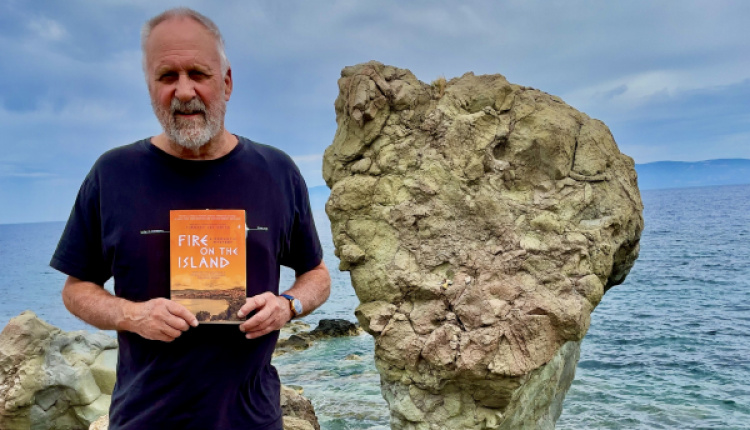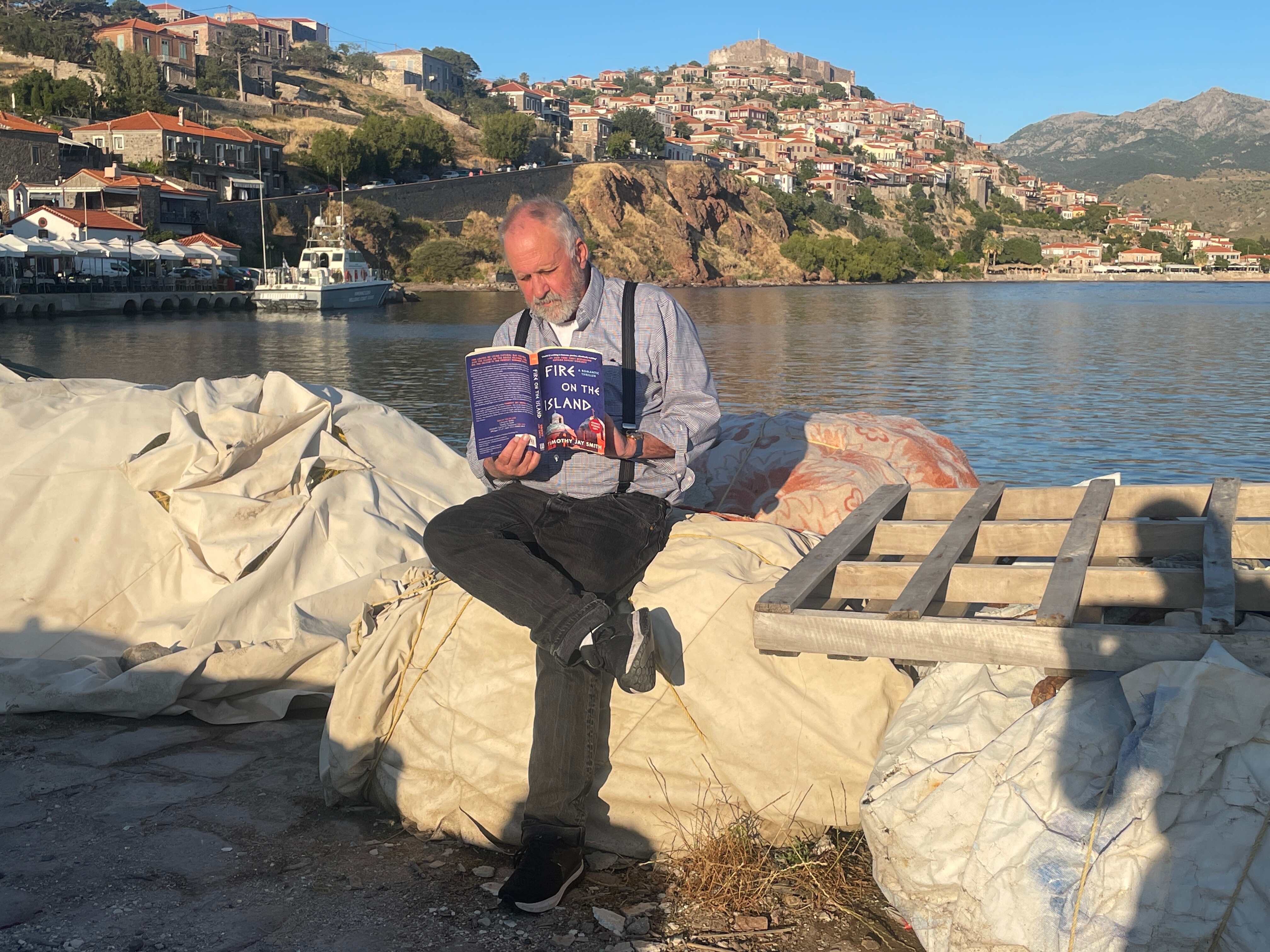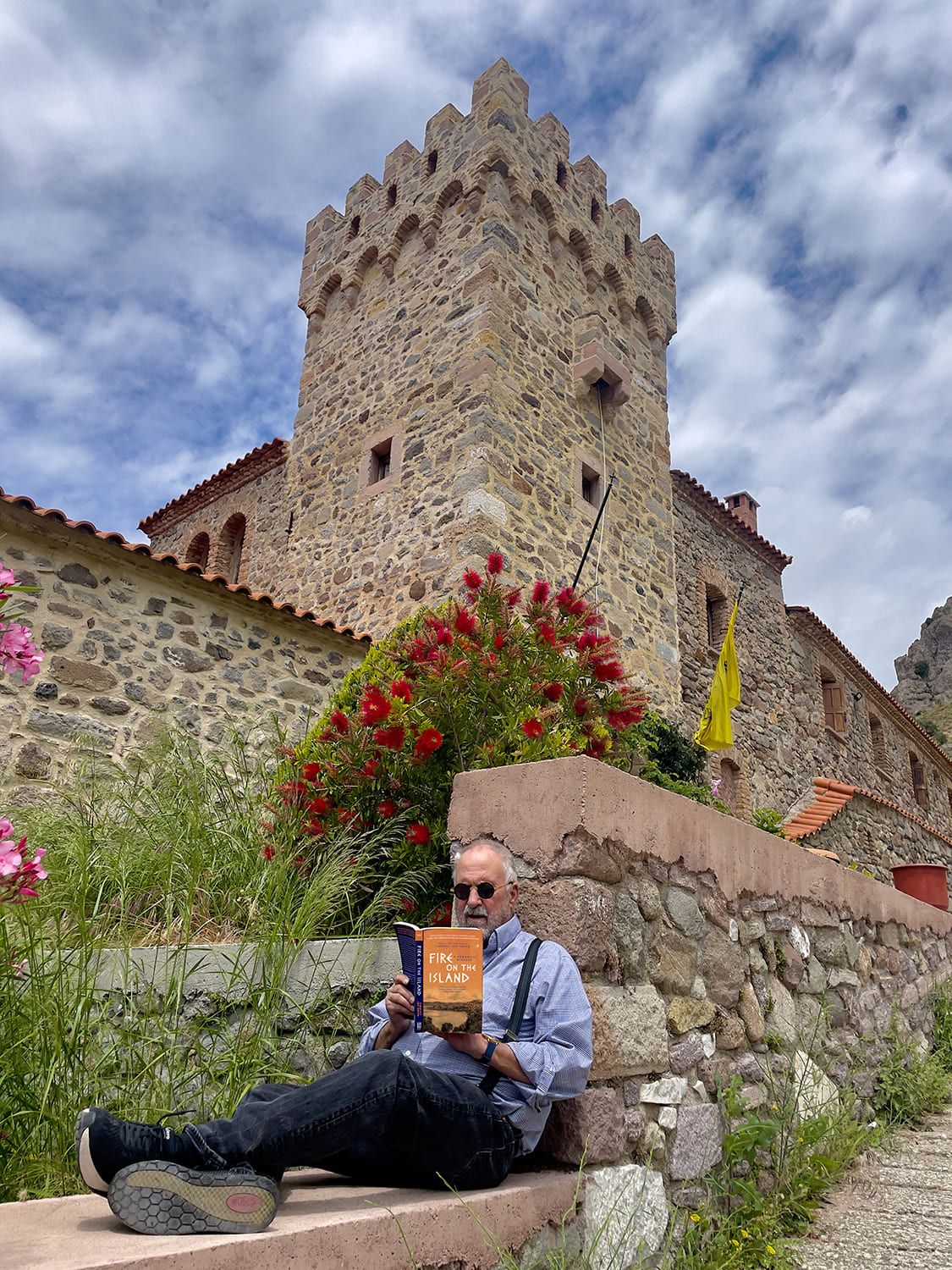Reading Fire On The Island: A Book Full Of Heat, Heart & Hope
- by XpatAthens
- Tuesday, 10 June 2025

A Journey to Vourvoulos (Not the One on Santorini)
From the first page, Fire on the Island transports you to the lesser-known Vourvoulos — not the Santorini village, but a fictional coastal town in Greece where beauty and hardship coexist. Through deeply evocative writing, Timothy Jay Smith doesn't just paint a scene; he places you right there. You can feel the sun and sense the sea breeze in the air. This is a Greece that tourists rarely see, raw, real, and heartbreakingly human.


Plot: Fire, Secrets & Soul
Greek-American FBI agent Nick Damigos arrives to investigate a string of suspicious arsons. As the mystery slowly unfolds, so do the lives of the villagers, complex, conflicted, and deeply intertwined. But while the fire is the plot’s ignition point, the heart of this book lies not in whodunnit suspense, but in its intimate human storytelling; its exploration of grief, identity, belonging, and resilience.
Smith uses the thriller structure as a vessel to explore something much bigger: the emotional and social layers that make up real communities facing real crises.
Characters & Greek Reality: A Village That Feels Alive
What makes Fire on the Island stand out is how deeply rooted in Greek life it feels. Smith doesn’t simply set his story in Greece, but he captures the rhythms, customs, tensions, and nuances of Greek village life with startling accuracy.
The characters, from Vassoula, the unapologetic village siren who flirts with fire in every sense, and Ridi, the Albanian immigrant, to Takis, the gay man and fierce and rebellious Athina, who represents a restless Greek youth. They all reflect different aspects of Greek society and especially, its contradictions.
Even secondary details reflect real Greek life: the stray cats, the gossip in cafés, the mingling of tradition and modernity. And then there is the church, not just a backdrop but a living part of the village ecosystem. In Vourvoulos, as in most Greek communities, the church isn’t only spiritual; it’s social, cultural, and often political. It's where people gather, judge, confess, celebrate, and mourn.
Whether it’s the tolling of bells or the priest appearing as an authority or social figure, the presence of the church helps anchor the novel’s events in a deeply Greek context. Its role is essential, just like in many real Greek villages, where faith and tradition often shape the boundaries of freedom, love, and identity.
By incorporating the church, along with its influence, its expectations and its (not always) silent rules, Smith once again adds another layer of realism to the story. It becomes clear that in Vourvoulos, as in much of Greece, the past is never fully past, and institutions like the church continue to hold both comfort and constraint.


Feminism & The Matriarchal Undercurrent
What may not be obvious at first but becomes strikingly clear is the feminist undercurrent running through the novel. Women, in all their forms and power, are the true emotional and moral anchors of this story.
You have Shirley, the English expat who came all the way from Australia, full of wit, experience, and unflinching strength. Then her daughter Lydia is the force of reason, the one who refuses to accept things at face value. She’s determined to complete the puzzle, to do her own research, to uncover what’s really going on beneath the surface, and she’s not afraid to wrestle with the norms of her community if that’s what it takes. And finally, Lydia’s daughter, Athina, full of fire, questioning everything around her, already a force of disruption in a rigid society.
These three women — grandmother, mother, and daughter — form a matrilineal triad, a modern Greek matriarchy, standing firm in a patriarchal setting. They don’t dominate with violence or ego, but with intelligence, emotion, and endurance. They challenge gender roles with their actions, choices, and refusal to be anyone but themselves.
Themes: Humanity, Hardship & Grief
Timothy Jay Smith masterfully blends social issues with personal, emotional journeys. Fire on the Island it’s about how people survive, adapt, and care in a world full of complexities. Beneath the sun-drenched beauty of Greece lies a community dealing with issues that feel all too real:
- The refugee crisis, shown not as an abstract problem but through human faces and suffering, especially in Jura’s story who may not be a refugee but experiences the luck of many
- Xenophobia, both casual and systemic, echoing wider European tensions
- The suppression of LGBTQ+ identities, especially in small, deeply traditional societies
- Suicide and the lifelong trauma of adoption, and how these wounds quietly shape lives
- Sexual firsts, revealing how coming-of-age is rarely what we expect
And deeply present in all of this is grief — raw, real grief. Grief for a child lost. Grief for a partner lost. Grief for a life not fully lived. Grief for love denied, for freedom never found, for a sense of home that may never exist.
Smith doesn’t dramatize grief; he honors it. He allows his characters to sit with it, wrestle with it, and sometimes, rise from it. Jura’s heartbreaking loss, Takis’s internal despair, Athina’s aching restlessness, they all carry forms of grief that are deeply human and universally felt.
Yet even with all this weight, the novel doesn’t collapse under it. What emerges instead is a strong current of resilience and compassion. The village is fractured, yes, but some people still show up, with food for refugees, with water, with care for stray animals, with truth, even when it’s difficult. And that’s what Fire on the Island ultimately celebrates: the endurance of kindness, even in a world set ablaze.


A Moment That Hurts (and Stays)
There are many moments in the book that strike the heart, but one scene that stands apart is that of Jura, the immigrant woman who nearly drowns, not metaphorically, but literally, trying to reach Greece. She survives, but her child does not. This moment, soaked in Ancient Greek tragic irony, is written with such emotional precision that it nearly breaks you. It's a quiet, crushing moment that forces the reader to sit with the weight of grief, helplessness, and injustice.
But Light Breaks Through
Despite the heartbreak, there’s joy, connection, and community. There’s the group giving sandwiches to refugees. There’s the care for stray cats, a subtle yet deeply Greek act of grassroots compassion. There’s Dingo, the stray dog Nick saves. In a world full of problems, these small gestures shine bright.
Language: A Truly Greek Story
The use of Greek language throughout the book is not only charming but grounding. Smith sprinkles Greek expressions and words with effortless precision, giving the reader the feel of the language without ever making it confusing. For readers unfamiliar with Greek, it’s a fun introduction. For Greek readers, it’s a sign of deep cultural respect and accuracy.
It feels like a mini Greek lesson, wrapped in storytelling, one that adds local flavor and roots the novel even deeper in its Aegean soil.
Lived Experience: Why This Story Feels Authentic
What makes Fire on the Island resonate so deeply is that it’s not written from a distance. It’s clear that Timothy Jay Smith has lived and breathed Greece not just visited, but truly experienced it. The villages, the people, the way the sea smells in the morning, the way gossip travels faster than the wind, all of it speaks to someone who knows this world from the inside. And that’s what good writing is: writing what you know, and doing it with honesty and heart.
The characters don’t feel imagined, they feel observed, absorbed, and lovingly recreated. Every one of them could be someone you’ve met in a Greek village. And, perhaps, in a way, they are. There’s a quiet sense that pieces of Timothy himself are woven into each of these people, that their struggles, desires, and contradictions are not only reflections of Greek society, but of a writer who sees and feels deeply.
This is why Fire on the Island doesn't just tell a story but transports you in a lived reality, one only someone who truly knows Greece could portray so truthfully.


Conclusion: A Book That Bears & Shares Real Feelings
Fire on the Island is more than a mystery. It’s more than a Greek village story. It is a novel of human truths, full of emotion, contradiction, warmth, and shadows.
It gives you what every great book should: the feeling that you’ve lived somewhere else, that you’ve felt other lives, that you’ve walked in someone else’s shoes under someone else’s sun. And when you close the final page, you feel a little changed, a little more aware, a little more compassionate, a little more human.
If you’re looking for a book that speaks to the soul, that delivers both tension and tenderness, that brings Greece alive in ways most travel guides never could, Fire on the Island is for you.
Ready to dive into the story? Get your copy of Fire on the Island HERE!
About the Author

Timothy Jay Smith is a critically acclaimed author with a lifelong passion for Greece. His travels and experiences, from working as a sociologist in Greece to aiding refugees on Lesvos, have inspired his immersive, character-driven stories. An award-winning novelist, screenwriter, and playwright, Smith’s work has garnered numerous accolades, including the Gold Medal in the Faulkner-Wisdom Competition for Fire on the Island not to mention that his screenplay adaptation of it was named Best Indie Script by WriteMovies. His diverse career has taken him around the world, from the streets of Istanbul to the jungles of Africa, giving him a unique perspective that brings depth and authenticity to his writing. Smith’s novels and screenplays have won top honors in competitions, and his stories resonate with readers for their vivid settings, complex characters, and rich social commentary.

Timothy Jay Smith is a critically acclaimed author with a lifelong passion for Greece. His travels and experiences, from working as a sociologist in Greece to aiding refugees on Lesvos, have inspired his immersive, character-driven stories. An award-winning novelist, screenwriter, and playwright, Smith’s work has garnered numerous accolades, including the Gold Medal in the Faulkner-Wisdom Competition for Fire on the Island not to mention that his screenplay adaptation of it was named Best Indie Script by WriteMovies. His diverse career has taken him around the world, from the streets of Istanbul to the jungles of Africa, giving him a unique perspective that brings depth and authenticity to his writing. Smith’s novels and screenplays have won top honors in competitions, and his stories resonate with readers for their vivid settings, complex characters, and rich social commentary.

